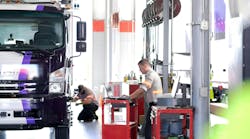Last month, Fleet Owner offered you a look at the top ten factors we believe will shape the trucking industry in the months ahead. Now with a brand new year waiting in the wings, we are all looking forward together again, discussing, hoping, wondering planning.
Nobody, of course, can really see the future, so why bother even trying? Well, for starters, trying to see a little farther down the road is an exercise that forces you up on your toes (metaphorically) as you strain to get a better view. And on your toes, ready for action, is just where most people in this business want to be. This is not an industry for simply sitting around and waiting for things to change.
Fleet Owner is not the only group striving to peer ahead through the tangle of emerging issues, current events and general confusion, either. The World Future Society (www.wfs.org), for example, is devoted to nothing else. “The forecasts should not be interpreted as predictions of what the future will be like,” they caution in their own recently-released Outlook 2008, “but rather as glimpses of what may happen or proposals for what should happen. They are intended to provoke thought and inspire action.”
Indeed, there are several things on the World Future Society 2008 forecast list that trucking industry professionals will find inspiring, worrisome or thought provoking. Here are just a few examples:
-
Worldwide consumption of crude oil will grow more than 40% by 2025
-
Global oil production, however, will soon peak
-
The number of vehicles on the world's roads will grow from 800 million now to 1.1 billion in 15 years
-
An advanced biofuel, dubbed “biobutanol,” and made from wheat, corn, sugarcane and other feedstocks will gain in popularity over ethanol
-
Commercial fleets that currently run diesel-powered vehicles are more likely to make the switch to biofuels because it is easier than it is for gasoline-powered vehicles
-
All sorts of decisions will increasingly be made by various forms of artificial intelligence rather than by humans. This is because technologies are increasing the complexity of our lives beyond our ability to keep pace well enough to avoid disasters due to human error.
If you are feeling especially buoyant this December, you may want to also take a look at their predictions concerning the environment, natural resources, terrorism and the economy, but I find that long, gloomy look weighs me down with too much worry, and that won't do. There is work to be done now and plenty of it. And if there is anything the trucking industry understands, it is hard work.
Trucking has so much to bring to this challenging era. We know how to deal with shortages, time pressures, shifting requirements and unreasonable expectations. Years before being “green” was popular, trucking knew that being green just made good business sense. Before there was a Dept. of Homeland Security, fleets were using technology to help protect their shippers' cargo, their drivers and their other assets.
For this industry then, forecasts are especially important tools. Not because they add to an already much-too-long worry list, but because they can help to focus thought and will on the things that matter the most — and on action.
So, I wish you a year of energy and enthusiasm and cheerful courage. After all, is there anyone else you would rather stand shoulder-to shoulder with than the people in this tough and savvy business? Well, neither would I.


